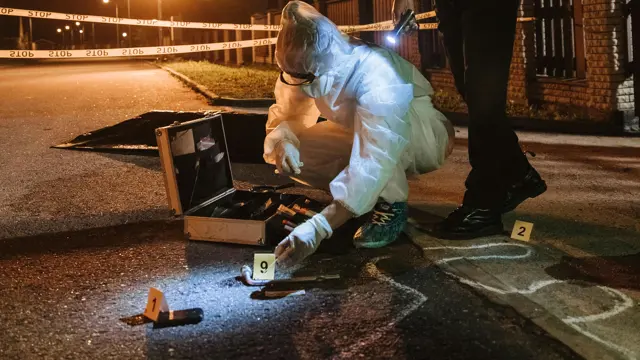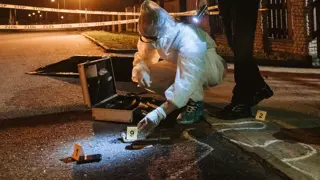
Crime Scene Investigation (CSI): Scenes of Crime Officer (SOCO)
Unlimited & Unconditional Learning - FREE Certificates, Transcript, Endorsement Letter - Tutor Support - Lifetime Access
NextGTraining
Summary
- Certificate of Honour - Free
- Reed Courses Certificate of Completion - Free
- Tutor is available to students
Add to basket or enquire
Overview
Course Overview:
Embark on a fascinating journey into the world of Crime Scene Investigation (CSI) with our Scenes of Crime Officer (SOCO) training programme. This course provides a comprehensive introduction to the principles, techniques, and procedures essential for conducting thorough and effective crime scene investigations. Participants will learn how to collect, preserve, and analyse physical evidence, as well as how to document crime scenes accurately and professionally.
Let's explore the benefits you'll enjoy:
REED Course Completion Certificate:
Download your FREE PDF copy of the REED Course Completion Certificate instantly from your learner dashboard after successfully finishing the Crime Scene Investigation (CSI): Scenes of Crime Officer (SOCO) course.
NextGTraining e-Certificate:
Complete your Crime Scene Investigation (CSI): Scenes of Crime Officer (SOCO) course and request the NextGTraining e-Certificate, which will be promptly delivered to your email. No additional charges required. You'll receive individual certificates for each course in the bundle.
FREE Endorsement Letter:
Upon completing the Crime Scene Investigation (CSI): Scenes of Crime Officer (SOCO) course, you can request for the NextGTraining Endorsement Letter for FREE. Showcase your accomplishments with pride!
Learning Outcomes:
Upon completion of this course, participants will:
- Understand the role and responsibilities of a Scenes of Crime Officer (SOCO) in the investigation of criminal incidents.
- Learn how to assess and secure a crime scene, including techniques for controlling access and preserving evidence.
- Gain practical skills in evidence collection, packaging, and preservation, with a focus on maintaining the chain of custody and preventing contamination.
- Become familiar with the principles and techniques of forensic photography and sketching for documenting crime scenes.
- Develop an understanding of the various methods used to process physical evidence, such as fingerprinting, DNA analysis, and chemical testing.
- Learn how to write accurate and detailed reports documenting the findings of a crime scene investigation.
Curriculum
-
Module 1: Introduction to Crime Scene Investigation 06:00
-
Module 2: Crime Scene Management 06:00
-
Module 3: Evidence Recognition and Preservation 07:00
-
Module 4: Forensic Photography and Sketching 06:00
-
Module 5: Fingerprint Analysis and Processing 06:00
-
Module 6: DNA Evidence Collection and Analysis 09:00
-
Module 7: Bloodstain Pattern Analysis 06:00
-
Module 8: Ballistics and Firearms Evidence 09:00
-
Module 9: Trace Evidence Analysis 07:00
-
Module 10: Digital Evidence Collection 08:00
-
Module 11: Case Management and Report Writing 06:00
-
Module 12: Quality Assurance and Continuous Improvement 09:00
-
Module 13: Health and Safety in CSI 08:00
-
Module 14: Ethics and Professionalism 06:00
-
Module 15: Specialised Crime Scenes 06:00
-
Module 16: Cold Case Investigations 06:00
-
Module 17: International Perspectives in CSI 06:00
-
Module 18: Emerging Trends and Technologies 06:00
-
Module 19: Public Engagement and Communication 06:00
-
Module 20: Professional Development and Career Pathways 06:00
Course media
Description
Crime Scene Investigation (CSI): Scenes of Crime Officer (SOCO) training is designed to equip individuals with the knowledge and practical skills required to work effectively as crime scene officers. Through a combination of classroom instruction, practical exercises, and case studies, participants will learn about the various types of physical evidence encountered at crime scenes, including fingerprints, DNA, blood spatter, and trace evidence. They will also gain an understanding of the importance of maintaining the integrity of evidence and following established protocols to ensure accurate and reliable results.
Crime Scene Investigation (CSI): Scenes of Crime Officer (SOCO) Course Curriculum
Module 1: Introduction to Crime Scene Investigation
- Lesson 1: Overview of Crime Scene Investigation (CSI)
- Lesson 2: Roles and Responsibilities of SOCOs
- Lesson 3: Legal and Ethical Considerations in CSI
Module 2: Crime Scene Management
- Lesson 1: Initial Response and Scene Assessment
- Lesson 2: Securing and Controlling the Crime Scene
- Lesson 3: Documentation and Note-taking Procedures
Module 3: Evidence Recognition and Preservation
- Lesson 1: Types of Physical Evidence
- Lesson 2: Techniques for Evidence Detection and Identification
- Lesson 3: Preservation Methods and Chain of Custody
Module 4: Forensic Photography and Sketching
- Lesson 1: Principles of Forensic Photography
- Lesson 2: Photography Equipment and Techniques
- Lesson 3: Sketching and Diagramming Crime Scenes
Module 5: Fingerprint Analysis and Processing
- Lesson 1: Understanding Fingerprints and their Types
- Lesson 2: Fingerprint Detection and Collection Methods
- Lesson 3: Latent Print Development Techniques
Module 6: DNA Evidence Collection and Analysis
- Lesson 1: Basics of DNA and DNA Profiling
- Lesson 2: Collection and Preservation of Biological Evidence
- Lesson 3: DNA Analysis Procedures and Interpretation
Module 7: Bloodstain Pattern Analysis
- Lesson 1: Fundamentals of Bloodstain Patterns
- Lesson 2: Methods for Bloodstain Documentation and Analysis
- Lesson 3: Interpreting Bloodstain Patterns at Crime Scenes
Module 8: Ballistics and Firearms Evidence
- Lesson 1: Introduction to Ballistics and Firearms
- Lesson 2: Firearm Identification and Functioning
- Lesson 3: Collection and Analysis of Firearms Evidence
Module 9: Trace Evidence Analysis
- Lesson 1: Types of Trace Evidence
- Lesson 2: Collection and Preservation of Trace Evidence
- Lesson 3: Microscopic Analysis Techniques
Module 10: Digital Evidence Collection
- Lesson 1: Overview of Digital Forensics
- Lesson 2: Seizing and Handling Digital Devices
- Lesson 3: Data Recovery and Analysis Techniques
Module 11: Case Management and Report Writing
- Lesson 1: Organising Crime Scene Investigations
- Lesson 2: Documenting Findings and Writing Reports
- Lesson 3: Presenting Evidence in Court
Module 12: Quality Assurance and Continuous Improvement
- Lesson 1: Ensuring Quality Control in CSI
- Lesson 2: Learning from Mistakes and Near Misses
- Lesson 3: Professional Development and Training Opportunities
Module 13: Health and Safety in CSI
- Lesson 1: Hazards and Risks in Crime Scene Investigations
- Lesson 2: Personal Protective Equipment (PPE) Requirements
- Lesson 3: Safeguarding Health and Well-being at Crime Scenes
Module 14: Ethics and Professionalism
- Lesson 1: Maintaining Integrity and Objectivity
- Lesson 2: Ethical Dilemmas in CSI
- Lesson 3: Upholding Professional Standards and Codes of Conduct
Module 15: Specialised Crime Scenes
- Lesson 1: Crime Scene Reconstruction Techniques
- Lesson 2: Mass Casualty Incidents and Disaster Response
- Lesson 3: Handling Complex Crime Scenes
Module 16: Cold Case Investigations
- Lesson 1: Strategies for Cold Case Review
- Lesson 2: Utilising Advances in Forensic Science
- Lesson 3: Overcoming Challenges in Cold Case Investigations
Module 17: International Perspectives in CSI
- Lesson 1: Comparative CSI Practices and Protocols
- Lesson 2: Collaboration and Information Sharing
- Lesson 3: Challenges and Opportunities in International CSI
Module 18: Emerging Trends and Technologies
- Lesson 1: Innovations in Crime Scene Investigation
- Lesson 2: Artificial Intelligence and Machine Learning in CSI
- Lesson 3: Future Directions of CSI Technology
Module 19: Public Engagement and Communication
- Lesson 1: Communicating with the Public about CSI
- Lesson 2: Building Community Trust and Confidence
- Lesson 3: Educating the Public about CSI Practices and Limitations
Module 20: Professional Development and Career Pathways
- Lesson 1: Advancing Your Career in CSI
- Lesson 2: Continuing Education and Training Opportunities
- Lesson 3: Networking and Professional Associations in CSI
Who Should Take This Course:
This course is ideal for individuals interested in pursuing a career in forensic science, law enforcement, or criminal justice, particularly in roles related to crime scene investigation. It is suitable for:
- Aspiring Scenes of Crime Officers (SOCOs) seeking to gain the necessary knowledge and skills to enter the field of crime scene investigation.
- Law enforcement personnel, including police officers, detectives, and crime scene technicians, looking to enhance their expertise in evidence collection and processing.
- Forensic science students or graduates interested in gaining practical experience in crime scene investigation techniques.
- Professionals working in related fields, such as private investigators, legal professionals, or insurance investigators, who wish to broaden their knowledge of forensic techniques and procedures.
- Anyone with a general interest in forensic science and crime scene investigation who wants to learn more about the methods and techniques used to solve crimes.
Who is this course for?
This Crime Scene Investigation (CSI): Scenes of Crime Officer (SOCO) course is perfect for :
- Individuals who are unsure where to start on their learning journey.
- Anyone looking to enrich their portfolio with exclusive and sought-after skills.
- Those who value practical advice and sound judgement in their professional endeavours.
- Students eager to expand their expertise and broaden their horizons.
Requirements
Enrolling in this captivating Crime Scene Investigation (CSI): Scenes of Crime Officer (SOCO) course doesn't require any prerequisites. However, we highly recommend that you be at least 19 years old and possess basic English and computer literacy skills.
This Crime Scene Investigation (CSI): Scenes of Crime Officer (SOCO) course is open to anyone, regardless of academic background or official qualifications. All you need is access to a smart device that can connect to the internet, and you're ready to embark on your learning journey.
Questions and answers
Currently there are no Q&As for this course. Be the first to ask a question.
Certificates
Certificate of Honour
Digital certificate - Included
Reed Courses Certificate of Completion
Digital certificate - Included
Will be downloadable when all lectures have been completed.
Reviews
Currently there are no reviews for this course. Be the first to leave a review.
Legal information
This course is advertised on reed.co.uk by the Course Provider, whose terms and conditions apply. Purchases are made directly from the Course Provider, and as such, content and materials are supplied by the Course Provider directly. Reed is acting as agent and not reseller in relation to this course. Reed's only responsibility is to facilitate your payment for the course. It is your responsibility to review and agree to the Course Provider's terms and conditions and satisfy yourself as to the suitability of the course you intend to purchase. Reed will not have any responsibility for the content of the course and/or associated materials.


